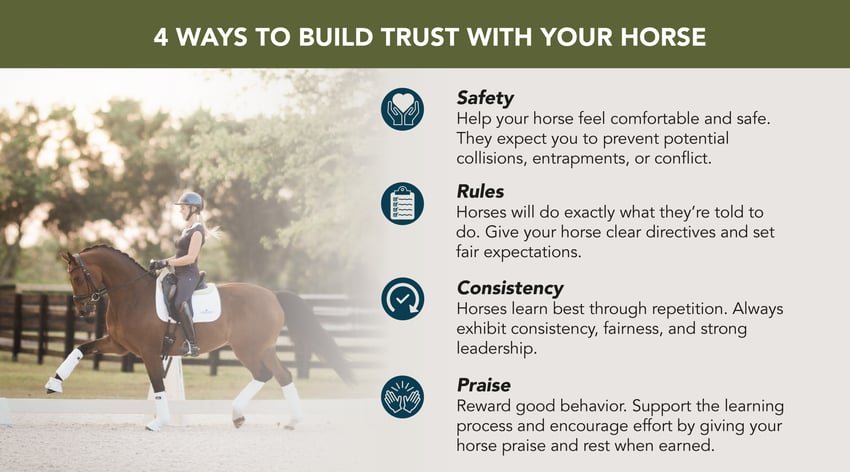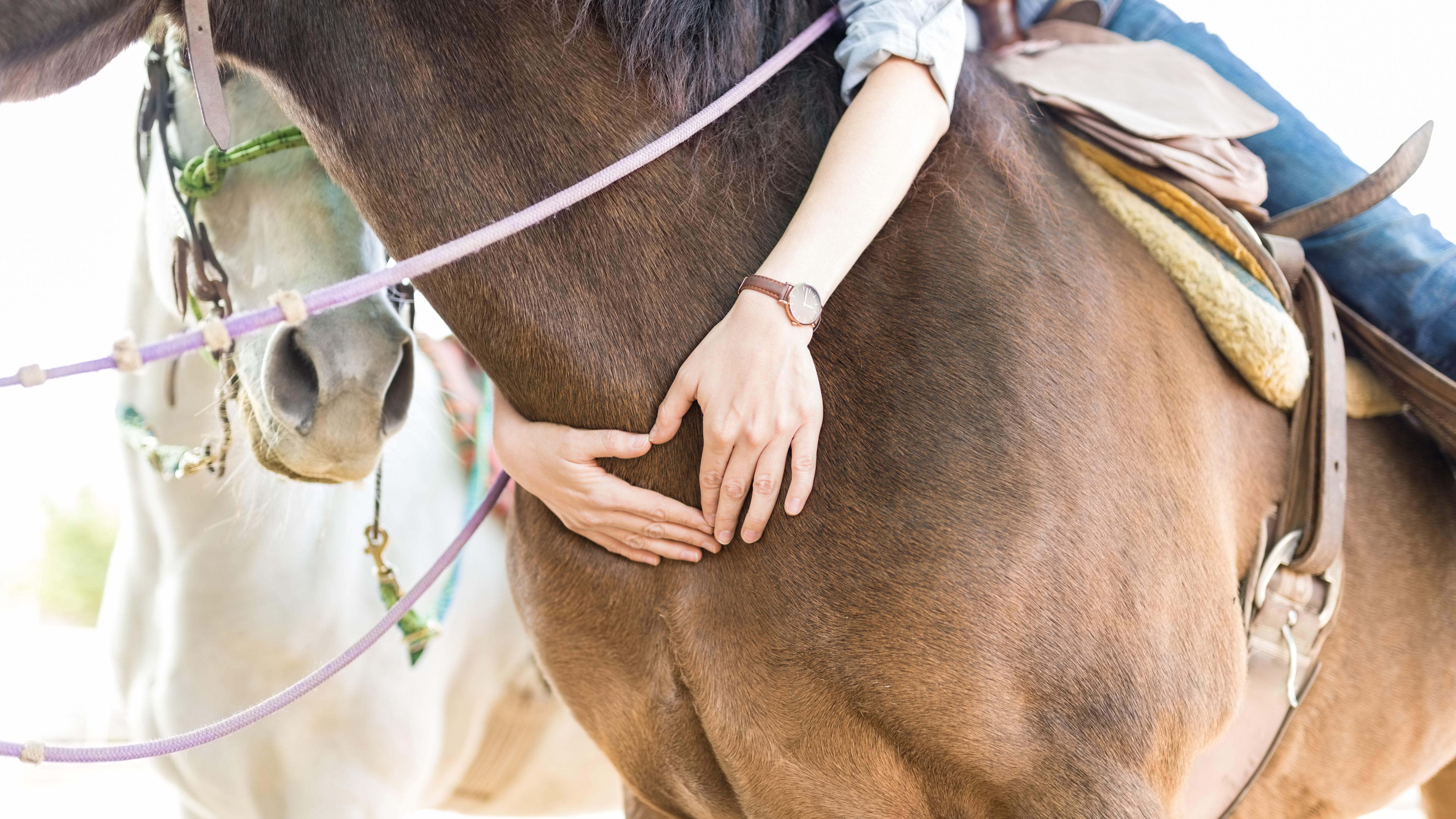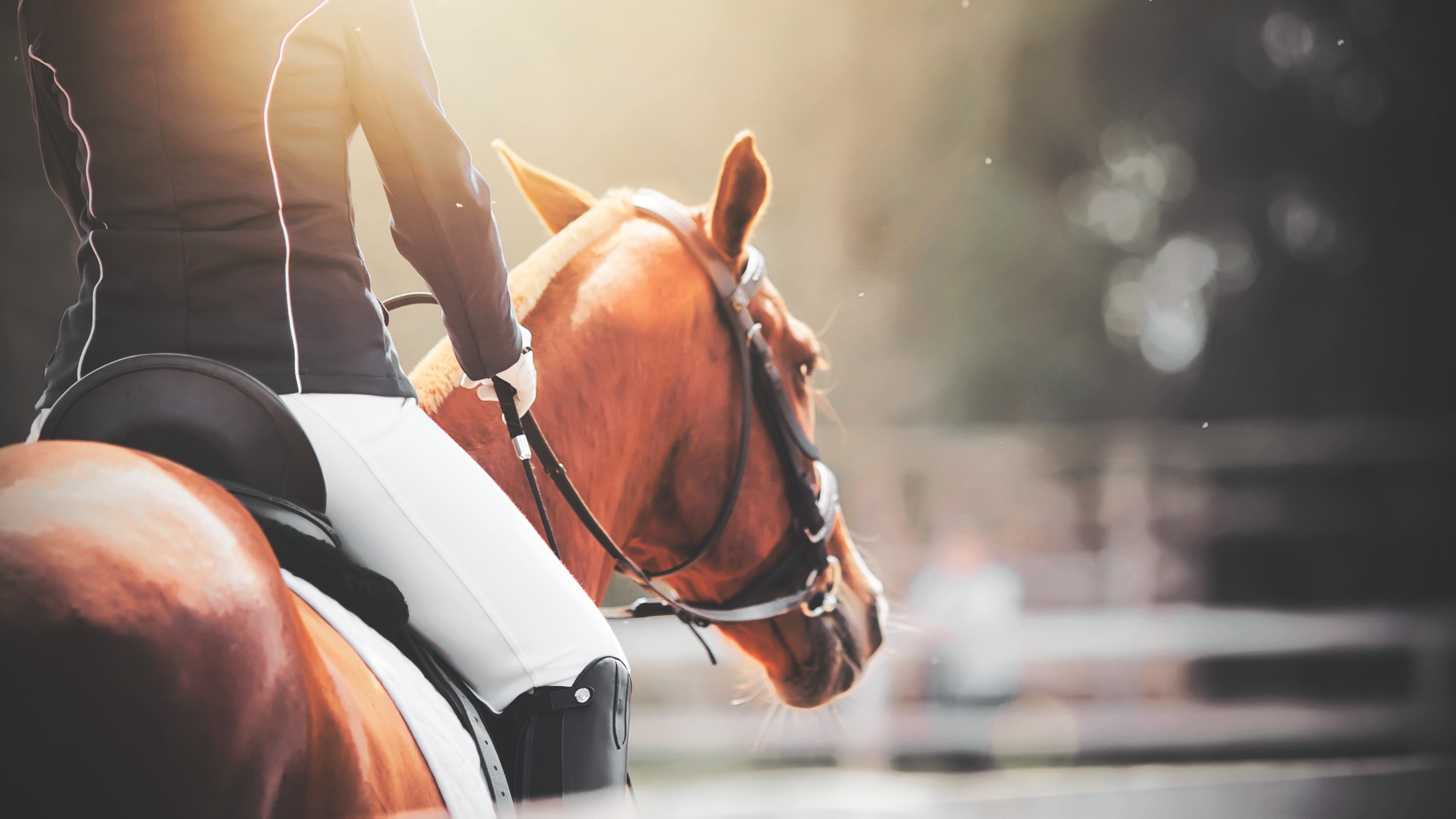How to Get a Horse to Trust You | Tips from Julie Goodnight
August 03, 2023
Tips from Julie Goodnight: How to Get a Horse to Trust You
In this article, award-winning educator Julie Goodnight talks about how to gain a horse’s trust. Julie teaches horsemanship domestically and internationally and was named Exceptional Equestrian Educator by Equine Affaire.
Horses know good leadership when they see it because their lives depend upon it.
We probably all agree that the ultimate relationship with a horse is one in which the horse looks up to you, wants to be with you, and feels safe and peaceful in your presence. But all the groundwork and trust-building exercises in the world won’t help you develop this relationship unless you present yourself as a competent leader at all times.
In every clinic that I teach, people ask how to go about gaining a horse's trust, yet I see them constantly doing things that show their horses they lack judgment and make poor decisions. It’s funny that horses see this so clearly, but humans—not so much.
Understanding How to Gain a Horse's Trust
People say all the time, “I want my horse to like me, and I want my horse to trust me!” All the “want” in the world won’t make this happen.
We know horses are very emotional animals, and we know them to also be very relationship oriented. The question isn't does your horse like you. It's does your horse trust you, and what are the signs that tell you?
Learning to read the signs from your horse that indicate his emotional state—and asking yourself what you are doing that is causing this reaction—will get you where you need to be.
What horses want the most is security and comfort. The following help horses feel comfortable and secure and build trust in you:
- They love things that make them feel safe
- They love clear rules and expectations
- They love consistency and strong leadership
- They love to rest
- They love to be praised for a job well done
- They love it when you take all the pressure off of them
Horses don’t like you or dislike you randomly. They react to how you make them feel—safe and content or anxious and uncomfortable. Analyzing the mistakes you make and the reactions of your horse will help you find the answers and bring your relationship with your horse to a whole new level.
3 Common Mistakes That Erode Trust
Your job as the leader is to watch out for the safety of your followers. Every time you give a horse a reason to question your judgment—because you’ve put him in a situation he perceives as unsafe—you’re chipping away at his faith in you.
There are three common mistakes I see people make every day that give their horses good reason not to trust their judgment and leadership. Watch for these mistakes closely next time you interact with your horse and make sure you're the leader your horse deserves.
1. Setting Your Horse Up For a Collision
An obedient riding horse goes in the direction you dictate, at the speed you set, without argument. The problem is horses are much more spatially aware than humans. Horses worry about other horses in the arena, and they expect the leader to watch ahead and prevent any potential horse-to-horse collision or conflict.
Most people are so consumed with themselves, they're oblivious to their surroundings, including what other horses are doing. Your horse always recognizes your lack of awareness, because his safety depends upon it. He sees the hazard even when you don’t.
I often see this when people are longeing or circling in an arena where there are other horses. First of all, let’s be clear on this. Longeing a horse in an arena where horses are being ridden is dangerous and should never happen. That’s a pretty basic safety rule.
At clinics, when everyone is doing circling work (and no horses are being ridden), people will still put their horses on a collision course with another horse. The horse always sees it; the person seldom does. If you do this, your horse starts doubting your judgment.
I also see this in the arena when all riders have their own agendas. The smart riders (and the good leaders) are looking well ahead. But invariably, there will be riders totally focused down on the horse’s withers, concentrating only on themselves, not even aware of their own horse, let alone the other horses in the arena.
Being aware of danger in your environment is a basic job of the leader. It's hard for your horse to think of you as the leader when you're failing at such a basic task.
2. Unintentionally Trapping Your Horse
Your horse may view a situation much differently than you, and may see danger where you do not. We, as humans, tend to analyze, rationalize, and justify the situation, while to your horse it’s simple—it’s either safe or not.
I often see riders and handlers put their horses in very precarious situations, with seemingly no awareness it was risky for the horse. Perhaps the rider had no awareness of how the horse views the situation. Or perhaps the rider made an executive decision to override instinct and go into an unsafe situation anyway because her logic tells her it’s safe (logic that the horse may not possess).
This happens at my clinics when we're teaching the horse to step back with a subtle hand signal. I always catch people backing their horse into a solid fence or, worse, another horse. The horse knows it's wrong and unsafe, but people get so caught up in the exercise of teaching the signal, they lose all awareness of surroundings and abdicate all responsibility for leadership.
Similar examples from the ground include asking a horse to step into a trailer, then standing right in front of him so he would have to bowl you over in order to comply. He’s pretty sure he’s not supposed to do that. Or asking the horse to trot on the lead line, but remaining right in front of him so there’s nowhere for him to go without running into you. It feels like a trap.
When riding in a group, it’s your job to keep your horse safe. Still, I see riders pass between a horse and the fence. Entrapment! There’s a reason fundamental safety rules exist—and it’s a fundamental rule to never pass between a horse and the rail. Horses can be very opportunistic when it comes to aggressive behavior and many horses will kick, given this opportunity. Your horse knows that as well, and he has good reason to question your judgment when he's the one that will likely take the blow.
3. Punishing Your Horse for Something You Ask Him to Do
Horses, by nature, are very willing animals that instinctively seek out approval and acceptance from the herd leader. When you are a fair and consistent leader, your horse will work hard to please you and will feel safe and content in your presence. When you notice his efforts and praise him for giving of himself, then your relationship kicks to a whole new level. There’s no limit to how hard a horse will try to please you when the right kind of give-and-take relationship exists.
We humans tend to fall down on our leadership in some very gut-wrenching ways to the horse. Often I see riders give a cue to the horse, then inadvertently punish him for responding to the cue.
The most common example of this occurs in the canter departure. The rider may lack confidence. The horse is cued to canter, then hit in the mouth with the bit when he does (because his head moves into the bit in that moment). It hurts his mouth and scares him, leaving him with the feeling that he is being punished for doing what was asked.
Sometimes I see riders miscue their horse then admonish him for responding to the cue given. Then the rider wonders why he suddenly stopped responding to that cue.
A perfect example is seen frequently when the rider, with two hands on the reins, asks the horse to turn with the inside rein then starts pulling on the outside rein too, effectively pulling the nose in two directions at the same time. Pulling on two reins to turn puts incredible undue pressure on the horse’s mouth. It appears to him that you asked him to turn, then penalized him with the outside rein when he did.
In that moment, the mistake was the rider’s. It’s the leader’s job to be clear in her directives. The horse did exactly what he was told to do, then was admonished for trying.

Does My Horse Like Me? How Riding Skills Affect Your Relationship
Recently at one of my clinics, a rider told me three different trainers told him flat-out that his horse did not like him. He was hoping the clinic would help him understand if the horse would ever come to like him or if he should get a different horse. I was hoping the clinic would help me understand why a trainer (let alone three of them) would say something like that to anyone, let alone their client.
In the case of the owner who was told that his horse did not like him, I personally found that to be ridiculous, but I gradually came to understand what was going on. It wasn’t a matter of who the horse “liked” and “disliked,” it was a matter of riding skill and how the horse reacted to the rider’s mistakes.
It was a young Quarter Horse gelding, only 3 years old and working very well under saddle. He had been trained and ridden by several different pro-riders since he was a 2-year-old. This is a great start for a horse, and it certainly showed in this horse’s performance at the clinic. He was cool as a cucumber and keeping up with much older and more experienced horses.
The reason why this guy thought his horse did not like him was that the horse was showing some signs of frustration when he rode—but not when the trainers rode him.
When a young horse is ridden primarily by pro-riders, that level of rider becomes the norm for that horse. Horses are highly sensitive, fast-learning animals—and they come to know the patterns, routines and idiosyncrasies of the rider fast. Of course, the pro-rider is generally very balanced, using light aids, and very consistent in her cues and expectations of the horse—giving praise and rest when earned, and correcting the horse fairly when needed.
The pro-rider that is very accustomed to riding green horses also knows what to expect and knows how to avoid problems. This consistency and confidence of the rider is palpable to the horse and results in a confident and compliant horse.
I learned a long time ago that when starting colts, it’s a good idea to have more than one person ride the horse, so that the young horse comes to understand that there will be different riders who cue and ride differently.
When a horse is only ever ridden by one person as a youngster, and that one person is a highly qualified rider, the horse rightfully may come to believe that all riders will be exactly this way. Then at some point, when the new rider comes along and cues differently, holds the reins tighter and gives conflicting and confusing signals, the horse can become stressed, shocked, and frustrated.
Signs that a Horse is Frustrated or Doesn’t Trust You
Horses are all quite different in their temperaments, so their reactions to a new and/or lesser skilled rider may range from mild frustration to downright anger and revolt. Some horses have a strong sense of right and wrong, fair and unfair. These horses tend to be less tolerant of the rider’s mistakes. Like people, some horses have the patience of a saint, while others, not so much.
When a trained horse becomes frustrated with the rider, the signs may be subtle, such as:
- Shaking his head
- Tensing/hollowing his body
More obvious signs include:
- Tail swishing
- Kicking out
- Flat out refusing to do what the rider asks
As a horse's frustration with a lesser-skilled rider grows, the signs become blatant. These are all signs a horse is frustrated with a rider and feels he is being treated unfairly:
- Shutting down
- Refusing to move forward
- Diving toward the gate or center of the arena
- Running right through the bridle—no steering, no brakes.
This nice Quarter Horse gelding we've been discussing did not dislike his owner—he just wished he rode as well as the trainers. The horse never acted out badly, he was just happy when the trainers rode—and a little frustrated when the novice owner rode.
When the rider made a mistake—like pulling back on the reins when he wanted the horse to go forward—the horse would get understandably frustrated and shake his head or swish his tail in irritation. This does not mean the horse did not “like” the person; it meant the rider needed to learn to ride better and own his mistakes.
Building Trust with Your Horse
Fortunately for us, horses don’t stand around the water cooler and decide which humans they like and dislike, or who did what to whom. They live in the present moment and they react to your actions (good or bad).
They learn to trust you—or not—based on your actions, not whether they like you. They get frustrated or irritated—or they become content and relaxed—based on what you do. That’s why most of the time when we are having problems with trained horses, we have to examine our own actions, not blame the horse.
As the clinic progressed, I worked with this rider to develop:
- A balanced seat and to ride with all his aids—not just his hands
- Controlling speed and direction without using the reins
- Cueing lightly and consistently
- Proper position in the saddle and moving fluidly with the horse
- Clear and reasonable expectations of his horse and following through with consistency
The young gelding worked very well for his proud owner, and at the end of the clinic I asked the rider, "Do you still think your horse doesn't like you?"
Seeing the huge smile on his face as he kissed his horse smack on the lips told me all I needed to know. Maybe it was my imagination, but in this moment, I thought I saw a twinkle in the horse’s eye that said, “Thank you for fixing my rider.”
Keep Trying & Enjoy the Ride
Being a good handler and rider takes time and effort. Gaining a horse's trust requires leadership and a lot more awareness. The more we think from our horse’s point of view, the deeper our understanding is of his behavior and the more rewarding the relationship with the horse. They are complicated animals, perceiving much more about us than we do about ourselves. That’s what makes horses so therapeutic to our souls.
If you're struggling to gain a horse's trust, seek out help and have others watch you—they’ll catch on faster than you about what cues you may be giving the horse. They’ll see what you can’t.
Also, let your horse guide you. He won’t lie to you; he either thinks of you as the leader or not. If he’s resistant and argumentative, he probably has a good reason. If he trusts you and looks up to you, you’re a good leader.
Enjoy the ride!
—Julie Goodnight
Learn More
- Stretch your horse like a pro with tips from two industry experts.
- Get helpful horse riding tips from competitive riders and trainers.
© Redmond Equine 2023. All rights reserved.
Related posts

The Secret to Connecting With Your "Heart Horse"
Have you found your heart horse? Learn the science of why horses are good therapy, what helps you bond, and how to strengthen the human-horse...
December 18, 2024

21 Horse Riding Tips for Beginners & Advanced Riders
Looking for help connecting with a horse and becoming a better rider? Get helpful horse riding tips from three pros to improve your skill and...



